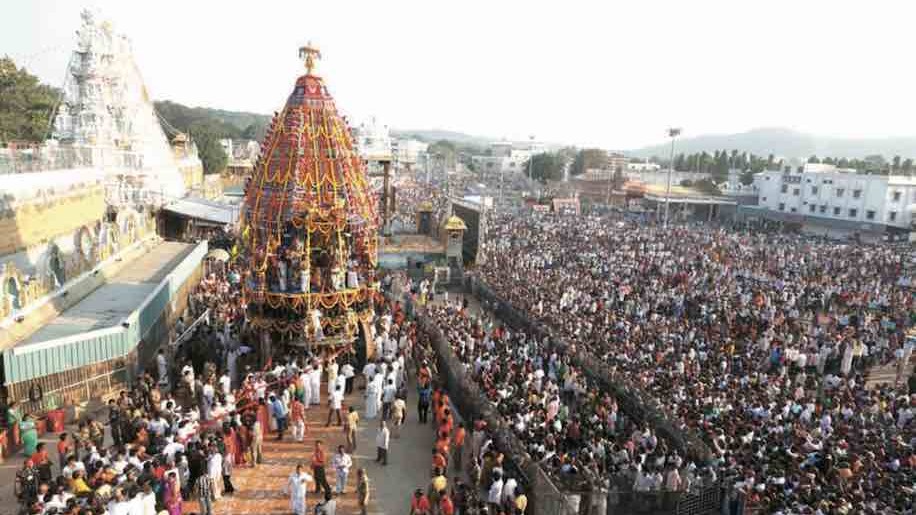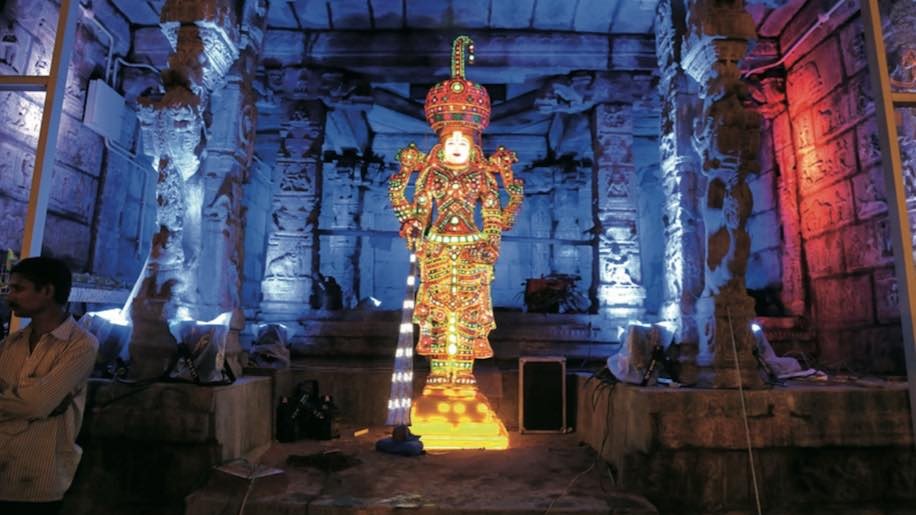
There are 86,400 seconds in a day, and we accommodate 86,400 people for darshan (paying respects to a deity) each day,” says a Tirumala Tirupati Devasthanams (TTD) Press Relations Officer. The line to the temple seems to be a never-ending one. Every minute sees at least one more body add to its length; such is the reverence for Lord Venkateswara or Balaji as he is more popularly known, whose shrine is the TTD temple.
Tirumala, completely governed by TTD, is a hill town above the city of Tirupati, which lies on the banks of river Swarnamukhi in the southern state of Andhra Pradesh. To reach the hills, a drive through Tirupati is inevitable, which is why its economy is largely dependent on the pilgrims. The need for food and accommodation has given rise to a number of eateries and hotels in the city. Commissioner of Tirupati Municipal Corporation, V. Vinay Chand IAS adds to this saying, “Tirupati is given a lot of focus by the Chief Minister because he wants it to be developed into an ecosystem emerging from spirituality.” There are two ways of reaching Tirumala. I landed in Chennai and drove down the remaining 160km. This one actually gives you a taste of South India’s pretty side, with sights of green fields, palm trees, little ponds, and grazing cattle as you speed down the two-lane road. The alternative to this is a train ride from any Indian city to the well connected Tirupati railway station. Tirupati has its own airport too, but is restricted to flights from Hyderabad and Vishakapatnam. My chat with the commissioner revealed that a new terminal is underway and hopefully, it will handle international flights.
You know you’re in Tirumala when pinkish-beige buildings start emerging en route. The top of the hill has been developed such that it almost resembles a citadel, only, the walls are lush greenery. Luxury to free accommodation is available for all types of travellers — single, couple, family and groups. Not a single one of them is dressed in western attire. Entry into the temple is barred to anyone in trousers and shirts. This explains the many kiosks selling traditional Indian clothes. They aren’t the slightest bit appealing, but come as a relief to those who haven’t read the rules on tirumala.org, the official website. There are exclusive shower and changing areas available in case a room is not a necessity.
Most people don’t mind setting base in Tirupati and trekking to and back from Tirumala on the same day — a 45-minute drive uphill. Besides, there is more variety of hotels in the city. I checked into ITC’s Fortune Kences, a luxury hotel. The start of my stay was a sumptuous one with dinner at The Orchid, a multi-cuisine restaurant. A fan of the state’s local flavours, vegetable stew with flat rice pancakes or appams, spicy fried prawns, and chicken tossed in spiced onions and chillies were good picks.
I was advised by the staff to leave early morning for Tirumala as the crowds increase threefold during the day. In spite of starting from the hotel at 5am, I encountered pilgrim traffic. Halfway up the hill, there is a security station where the car’s trunk and glovebox are checked, passengers are made to walk through a body scanner, and all luggage, including your handbag is put through an X-ray machine. Once atop the hill, I left my car in the parking lot and hailed a local rickshaw (prices are negotiable and unjustifiably high) to take me to one of the many temple entrances as indicated on my VIP ticket. The longest queue is by those who would rather wait than pay to meet their God. The special darshan costs `300 and saves not more than two hours of queuing time — these are limited and can be bought in advance from the official website. The elderly and physically abled have a separate entrance. People are known to wait 18-22 hours a day for that one second glimpse of Lord Balaji.
Once inside the temple, expect to be pressed between bodies from both sides. You don’t need to move, let the crowds carry you through. Had it not been for my guide, I would have missed seeing the idol as one never knows in which direction to face when trying to keep from being suffocated. As you exit, a huge cloth bag from ceiling to floor receives monetary gifts in multitudes from devotees. It isn’t surprising to see a few toss in gold and diamond as well. When it is time to empty the sack, people actually queue up again until it is back in place.
Exactly a year ago, Tirumala’s shrine deposited 1,800 kilos of gold, collected as offerings, with the State Bank of India. With this, its total gold deposits now crosses 5,000 kilos. TTD is, after all, one of the biggest and most worshipped temples in South India.

Tirumala is also the largest hair collection venue in India, some reckon it is the largest in Asia. India’s wig-making industry is heavily dependent on Tirumala. Tonsuring for pilgrims symbolises the shunning of ego and the embracing of humility.
On an average, 40,000 male and female heads are shaved daily — either as part of their prayer or in gratitude to its fulfilment. On June 1, they recorded 72,251 tonsures.
Should you decide to go bald as well, set aside an hour of queuing time. The temple premises has a building of 600-700 barbers working round the clock, and 500 kg is an easy collection per day. Last year TTD earned `77.72 crore by selling over 106 tonnes of human hair. These are then exported by local traders to China, Europe, USA and Africa. In 2013, TTD launched an e-auction portal and since then the industry has crossed the `200 crore mark.
Finally, when you leave, make sure to collect the Geographical Indication patented laddoos, taken as blessings. Of the total production, 40 per cent are sold at cost for `25, and 60 per cent for `10. Eating this is as good as getting benediction from the Lord himself. The patent is so that naive devotees won’t be fooled by imitations.
On the face of it, TTD comes across as a business. In reality, there is more to it. For starters, all funds are directed to social causes. Free education, free wedding ceremonies for those who can’t afford a priest, free medical services and donations in the form of books and medicine is part of their fund allocation.
To name a few, Sri Venkateswara Institute of Medical Sciences (SVIMS) by TTD is a super speciality college in Tirupati. It offers education at a nominal cost to the less fortunate. Sri Venkateswara Poor Home is for the destitute. Aswini Hospital in Tirumala is a free service. Balaji Institute of Surgery, Rehabilitation & Research gives free aid and appliances to the physically disabled. The hygiene and upkeep of the temple’s premises itself are commendable. The food that is donated to nearly one lakh hungry people is of the same standard as what is bought from its canteens. The entire journey for me has been an overwhelming one — not so much spiritually as physically. Nonetheless, it warms the heart to know that good operates on such a grand scale, and selflessly.












